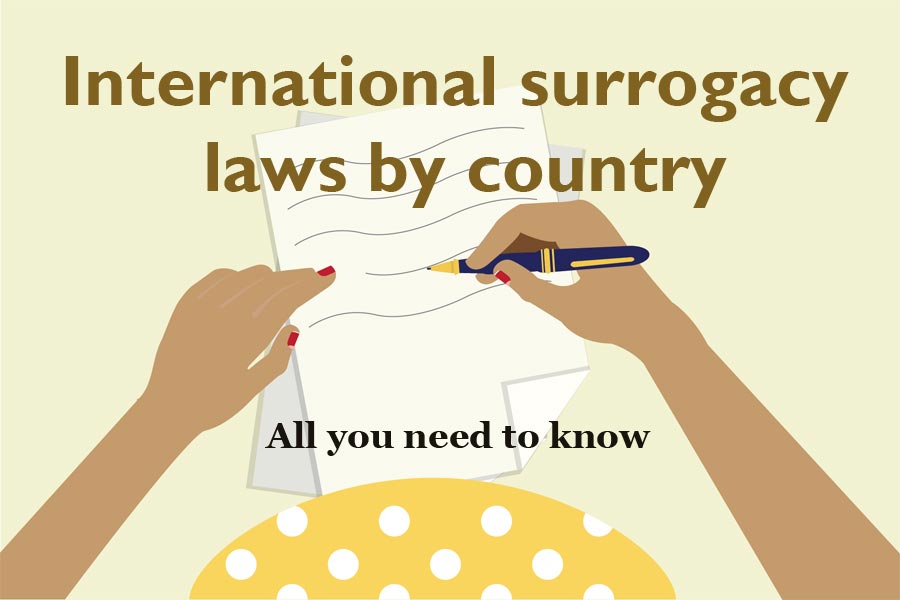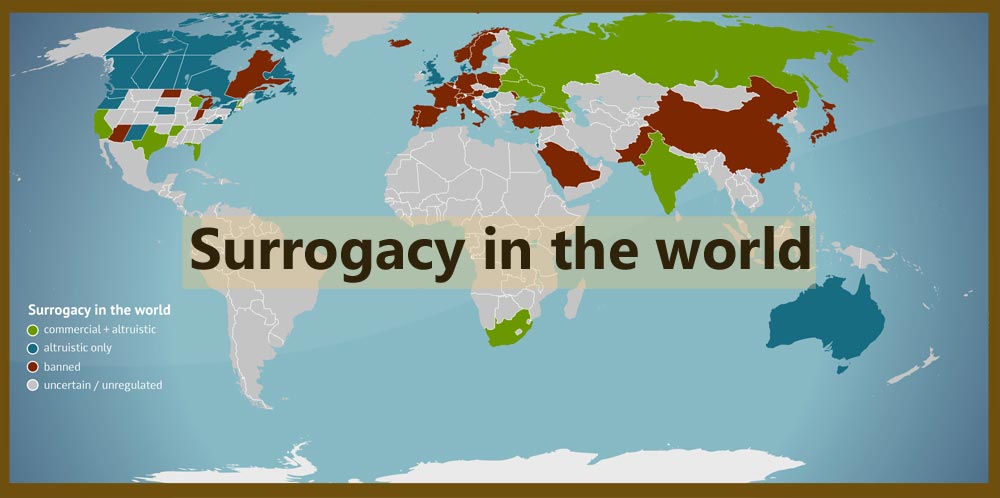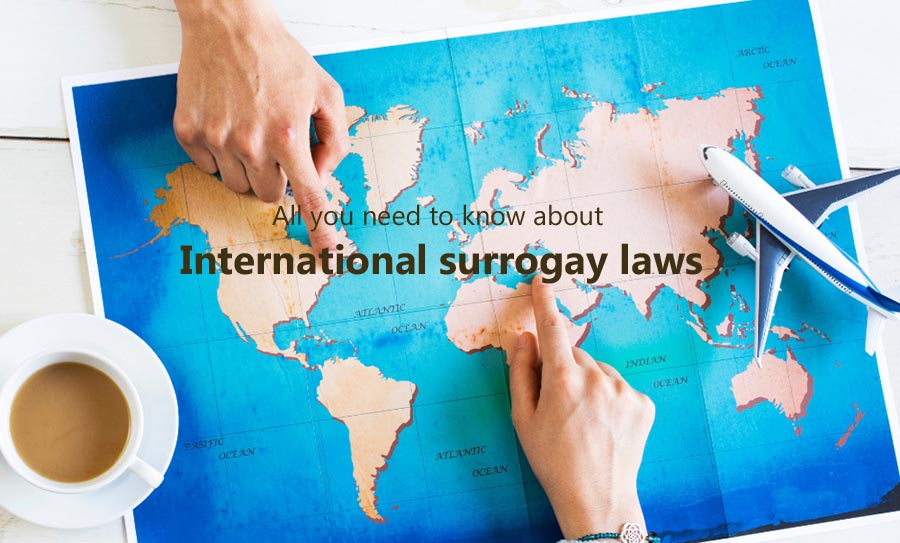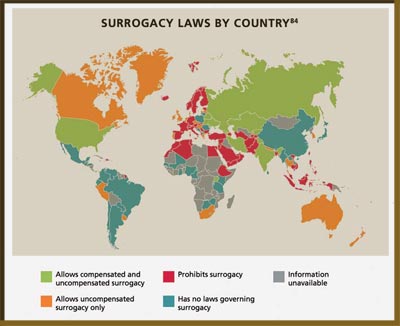 Surrogacy laws of a particular nation hold utmost importance for anyone looking to pursue a surrogacy arrangement in that very country. This is due to the fact that if surrogacy is banned in that nation, you may fall into some deep legal troubles out of nowhere.
Surrogacy laws of a particular nation hold utmost importance for anyone looking to pursue a surrogacy arrangement in that very country. This is due to the fact that if surrogacy is banned in that nation, you may fall into some deep legal troubles out of nowhere.
On the other side, few nations do permit surrogacy subject to the fulfillment of certain legal criteria. So, given that you have the required awareness of International surrogacy laws, you can simply go through your surrogacy journey without any hassles.
Different nations have different surrogacy laws and you might find it useful in one country but not so much in another as a result. However, it is imperative that you get informed about the surrogacy regulations in your home country or the country where you wish to pursue surrogacy as you are ready to take the first step on your surrogacy journey.
Furthermore, only a limited number of people are permitted to pursue surrogacy within the confines of many nations’ surrogacy laws and regulations. This means that a country may or may not let unmarried couples, single parents, or parents who identify as LGBT use surrogacy within its legal territories.
Well, to make it easy for you, we have created a list of the best surrogacy locations, together with the relevant surrogacy regulations in each jurisdiction. Moreover, you can consult with our legal professionals at Surrogacy agency Kenya for more information on the surrogacy laws of these countries.
Surrogacy laws in Kenya
Many international couples from around the world choose Kenya as their preferred surrogacy location. This is due to the low-cost surrogacy options backed by state-of-the-art medical support systems and supportive surrogacy laws in Kenya.
Under international surrogacy laws, if we talk about laws for surrogacy in Kenya, surrogacy is currently unregulated in this part of the world. So, if you are concerned with the question of whether is surrogacy allowed in Kenya you must know that it is neither permitted nor banned in Kenya.
Additionally, the surrogates in this case desire to live with their families during the surrogacy process. This way, the intended parents can consequently save a sizable sum of money on the complete arrangement.
According to laws for surrogacy in Kenya, all parties must sign an agreement before the surrogacy process may start. The agreement specifies that after the baby is delivered, the surrogate will easily transfer custody of the child to the intended parents and will get payment as compensation.
The intended parents must file a petition with the court on the third day after the baby is born to request permission from the judge to become the infant’s legal parents. Moreover, the Court subsequently directs the Department of Vital Statistics to issue a fresh birth certificate in the intended parents’ names as the newborn’s legitimate legal parents.
Once the legal process is through, the gestational surrogate has no further contact with the child. Besides, surrogate agencies prefer married women with children for the surrogacy operation and the surrogates should be between the age range of 23 and 40 years. Moreover, the surrogates required a lot of emotional, mental, and bodily support from their families to endure the surrogacy procedure.
The absence of surrogacy laws in Kenya is a major benefit of choosing this country for their surrogacy aspirations. In order to realize their desire to become parents, anyone regardless of sexual orientation can pursue surrogacy in this part of the world.
Kenya is a country where individuals from other nations can readily and affordably use the services of egg donors and surrogates. Additionally, Kenya has access to skilled and knowledgeable fertility experts that can assist infertile couples.
So, while going by your surrogacy aspirations, you need not worry about anything in this beautiful African country.

Surrogacy laws in Australia
Another country under our International surrogacy laws explanation is Australia. Australia is regularly mentioned as a popular choice for prospective parents from across the globe. Additionally, laws for surrogacy in Australia vary on a state-to-state basis. Still, most of the states only permit altruistic surrogacy here. Additionally, while looking for a surrogate mother or other pertinent services, prospective parents are not allowed to publish any advertisements or commercials in the media.
Fortunately, there are some general surrogacy laws in Australia that can assist those who may be considering surrogacy in understanding what is and is not permitted in their local jurisdictions.
The following holds true for all states and territories (other than the NT):
- Anywhere in Australia, it is illegal to enter into a commercial surrogacy agreement.
- A surrogate mother must be at least 25 years old in all jurisdictions outside of SA and the ACT in order to serve as a surrogate. Moreover, Surrogates must be at least 18 years old in SA and the ACT.
- In the majority of jurisdictions, surrogacy must be justified medically (although NSW, TAS, QLD, and VIC allow surrogacy for social reasons, such as same-sex couples). It should be noted that WA expressly disallows “age” as a valid medical justification and that there are no social or medical requirements for surrogacy in the ACT.
- Surrogates in VIC, TAS, and ACT cannot serve as surrogates unless they have already given birth to their own children.
- Except for Washington, all States and Territories allow same-sex couples to use surrogacy.
- In all States and territories, with the exception of the ACT, single women are eligible to become surrogates; however, this is not the case for single men.
- All States and Territories, with the exception of VIC and the ACT, require that a written agreement outlining the surrogacy agreement be in place.
- In Australia, traditional surrogacy is legal everywhere besides in the ACT.
- In the ACT, QLD, and VIC, you are not permitted to advertise, whether you are looking for a surrogate or want to be one. Online publishing is included in this.
Surrogacy laws in Canada
Surrogacy is legal and regulated in Canada under the federal Assisted Human Reproduction Act (AHRA). However, some provincial surrogacy laws in Canada, such as those that define who has parental rights, are also very significant.
Moreover, Surrogates are only eligible for reimbursement of expenses; they cannot be paid for their services. The ARHA states that all surrogacy in Canada must be “altruistic.” The surrogate is unable to make money off of her position as a result. Besides, surrogates are only permitted to be reimbursed or paid for a specific set of expenses; they are not permitted to be paid a salary. This state does not allow a surrogate to charge a fee, in contrast to others like California.
Moreover, surrogacy cannot occur without a surrogacy agreement, as per laws for surrogacy in Canada. The surrogate shall also, prior to the execution of the Agreement, obtain independent legal advice in accordance with Canadian law.
The time leading up to, during, and following the pregnancy are all covered by surrogacy agreements. It will describe how the parties intend to proceed with regard to important matters like the child’s parental rights, whether the surrogate will interact with the child, whether a pregnancy will be terminated, how eligible expenses will be paid for, etc.
Depending on the province where the child was born, there are different procedures for becoming a child’s legal parents as per surrogacy laws in Canada. Moreover, the process for intended parents to have their parental rights recognized will be impacted by the province where the child is born, whether the intended parents have a genetic connection to the child, and whether the surrogate has a genetic connection to the child.

Surrogacy laws in Ukraine
Another country that has grown in popularity among couples looking for surrogacy in recent years is Ukraine. You should be aware that only heterosexual couples are eligible to participate in a surrogacy program in this country before moving forward with your surrogacy plan.
In Ukraine, the Family Code, which is a piece of legislation or laws for surrogacy in Canada, recognizes and permits surrogacy. Moreover, special acts govern the application process for surrogacy and other forms of ART in the country.
On the other hand, the spouses of a child born by a surrogate mother are legally recognized as the child’s parents in Ukraine. Besides, the risk of potential abuse by the surrogate mother is reduced by this clause from surrogacy laws in Ukraine, which also safeguards the rights of the spouses and the child.
Surrogacy laws in China
According to surrogacy laws in china, no surrogacy arrangement is currently permitted in the country. So, one needs to look out for other destinations like Kenya, Ukraine, or Canada.
Surrogacy laws in Cambodia
Just like China, Cambodia has also criminalized surrogacy as per the laws for surrogacy in Cambodia. Hence, being an intended parent, you do have the option to check other surrogacy destinations.
Surrogacy laws in Georgia
 Only married, heterosexual couples are permitted to carry out surrogacy in Georgia according to the laws for surrogacy in Georgia. Moreover, Georgia prohibits surrogacy for gay couples and single parents.
Only married, heterosexual couples are permitted to carry out surrogacy in Georgia according to the laws for surrogacy in Georgia. Moreover, Georgia prohibits surrogacy for gay couples and single parents.
- The surrogacy laws in Georgia permit both commercial and altruistic surrogacy. To make sure that everyone involved receives the desired outcomes from the process, a surrogacy contract will need to be created for each case and thoroughly reviewed.
- Donations of eggs and sperm are permitted if the couple requires them. Besides, the intended parents can be told who the donor is and, can even meet the individual in person.
- At the time of birth, the intended parents will be the legal parents of the born child. They will be granted all of the legal privileges and obligations that go along with it, whereas the surrogate will not be accorded any maternal rights or obligations at all.
- After the baby is born, the birth certificate will be issued within 24 hours.
- The birth certificate will include the names of the intended parents.
Unlike some nations that demand the surrogate to renounce her rights upon the birth of the child, the intended parents do not need the surrogate’s written consent in order to be named as the child’s legal parents in Georgia.
How our legal specialists will make it easy for you?
Our team of legal professionals at Surrogacy agency Kenya has spent years studying and researching surrogacy laws all over the world. These legal professionals will support you throughout the entire surrogacy process to keep things as simple as possible for you.
Moreover, their presence will be helpful while negotiating with the surrogate mother or vying for custody of the child. Connect with our coordinators right away for a free consultation!

No Comments